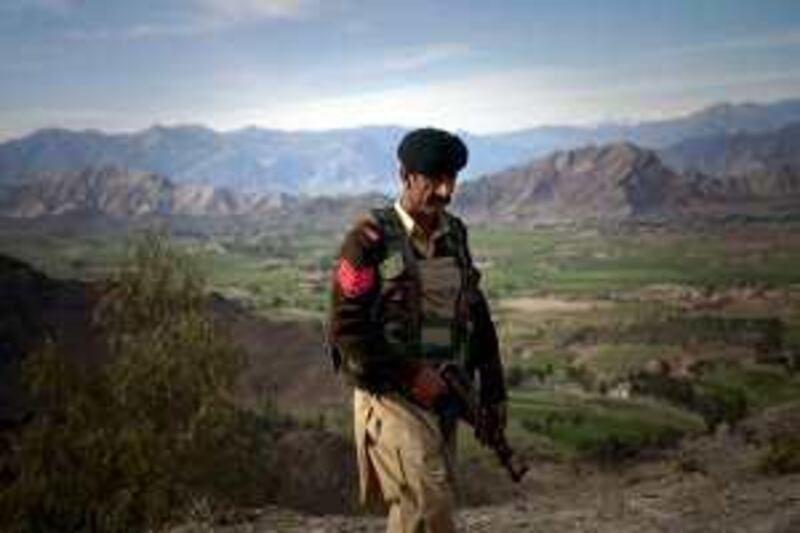ISLAMABAD // Pakistan fears an influx of American troops into southern Afghanistan will drive Taliban militants across the border into its own troubled Baluchistan province. Last month, the US sent several thousands troops into Helmand province in an attempt to quash the Taliban influence ahead of Afghan elections later this month. But Pakistani intelligence officials say they are concerned that militants may be forced over the border and regroup with the Taliban's main council, or the Quetta Shura, which is believed by both Pakistani and US officials to be based in Baluchistan.
Pakistan has deployed forces including more than 2,000 regular troops to its over 200km-long border along Afghanistan's Helmand province and allowed Nato military observers to monitor its efforts to seal the border. Major Gen Saleem Nawaz, the inspector general of the Frontier Corps, said this was not the first time US operations across the border had caused some concern in Pakistan. "Rather operations of foreign forces have been conducted in the past and Pakistani forces have been alert on the Pak-Afghan border vis-a-vis terrorists," he said.
He confirmed there had been no arrests of cross-border militants so far. Until earlier this year, US diplomats had held back from criticising Pakistan's slow approach to tackling the Afghan Taliban's senior council, thought to be in Quetta, the provincial capital. British commanders voiced concerns about the lack of action when UK forces were first deployed in Helmand more than two years ago. Pakistan reacted by arresting some senior Taliban commanders in Baluchistan.
At least one commander was handed over to the US but several others were released. Pakistani security agencies said nearly 25 al Qa'eda and more than 500 Taliban members - including key leaders such as Sahrif al Misri, Munsoor Dadullah and Mulla Obaidullah; the Taliban spokesman, Lutfullah Hakeemi; Abdul Ahad Jahangirwal and the Taliban leader who claims to be governor of Kandahar, Mullah Mohammadzai alias Abdulla - have been tracked down in Baluchistan since the US-led war on terrorism was launched in 2001.
Last week, security agencies backed by paramilitary forces and local police arrested seven Pakistan and Afghan Taliban and recovered explosives and suicide jackets after a gunfight with those in a house in a well-heeled suburb of Quetta. A Pakistani Taliban activist was killed while four others reportedly escaped. Quetta has been a hub for Afghan jihadi groups and later Taliban leaders and their activists due to the presence of more than 1.5 million Afghan refugees since 1979.
After the collapse of Afghanistan's Taliban government following the US-led invasion in 2001, Taliban leaders and militants found shelter in Afghan dwellings and refugee camps in Quetta and northern Baluchistan in the Pashtun dominated areas. Though Taliban militants have been dormant in Baluchistan, they have been gathering in mosques, seminaries and private houses to review their strategy and evolve a new line of action in Afghanistan against Nato forces, according to an intelligence official.
With its troops deployed directly across the border, Washington has taken a deeper interest in the Quetta shura and is exerting pressure on Islamabad to crack down on Taliban havens in Baluchistan. However, military officials in Pakistan have said they do not wish to prompt an insurgency in Baluchistan at a time when the army is already heavily engaged in fighting in the tribal areas and North West Frontier Province (NWFP). "We are concerned about the presence of the Taliban shura members. If Taliban fleeing from Afghanistan were to come in contact with the former, it will create new problems - as the US will jump into action to start drone attacks in Baluchistan," said an intelligence official based in the province.
"The Quetta shura has no permanent structure, but is a fluid body that works on the guided policies of its leader Mullah Mohammed Omar and has field commanders who give directions to lower tiers of fighters," said one security official who has tracked down more than 50 Taliban activists including Hakeemi, the Taliban spokesman and Obaidullah, a key leader. He said the shura could be meeting in Quetta or surrounding districts such as Mustung, Killa Abdullah and Pishin, but could also meet anywhere. "It does not mean that security agencies are sitting like lame ducks, we are after them and will track them down," he said.
Pakistani officials say their national priority is to fight the local Taliban which is the biggest threat to the government. But analysts claim Pakistan has maintained links with Afghanistan's Taliban in order to protect its western border from the machinations of its arch-rival India, when Nato and allied forces withdraw from Afghanistan. Pakistan still views India as its greatest threat. The two nations have fought three wars over the past six decades.
Pakistan shares a 2,600-km border with Afghanistan, inhabited on both sides by ethnic Pashtuns with strong family and clan ties who travel freely across the frontier. The Helmand-Chaghai border is a mountainous, porous region used by Taliban activists and drug traffickers. Some 90 per cent of the poppy and heroin produced in Helmand province comes across the same border and travels onwards via Iran or sea to Europe.
The movement of local people across the border has ground to a halt since the US operation began. People living in villages close to the border are only allowed to move around at certain times and have been directed to restrict their movements, especially at night, so that they are not mistaken for the enemy and hit by air strikes. They have also been advised not to travel in four-door pick-up vehicles, commonly used by the Taliban, and to switch off their satellite phones or equipment which may gave the wrong signal to Nato aircraft circling overhead.
iwilkinson@thenational.ae






